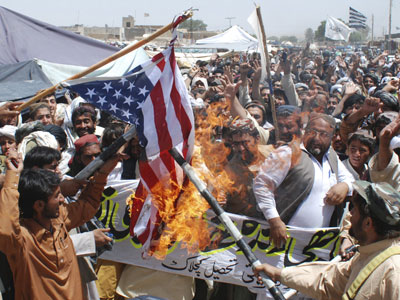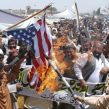
Contradictions in Pakistan’s Counterterrorism Strategy Leading to Security Collapse
Publication: Terrorism Monitor Volume: 9 Issue: 24
By:

Few in Pakistan doubt that the United States and Pakistan are headed for a total divorce, at least on the question of Pakistan’s counterterrorism strategy in the near future. A strongly-worded press release issued by the Pakistani military’s Inter-Service Public Relations (ISPR) after the 139th Corps Commanders Conference on June 9 seems to have finally sealed the fate of the deteriorating Pakistan-U.S. relations on the question of how to carry out the war on terror in the future. [1] If the ISPR press release is any guide, the Corps Commanders’ Conference devoted most of its time to Pakistani-U.S. relations and domestic issues arising out of Pakistan’s relations with the United States and its conduct of war on terror. A much smaller passage focused on the sacrifices the Pakistani armed forces have made in the war on terror.
Most importantly, the Corps Commanders Conference decided to stop accepting financial assistance from the United States in the future. Announcing this politely but in no ambiguous way, the ISPR statement asked the Pakistani government to divert “the U.S. funds meant for military assistance to [the] Army to economic aid to Pakistan, which can be used for reducing the burden on the common man.” The statement seems to be politically motivated as U.S. military assistance may not be converted into civilian aid. The ISPR statement also made a controversial claim about the Coalition Support Funds (CSF) that is likely to raise controversy in the coming days. The CSF was created after 9/11 to compensate certain U.S. allies for their assistance in waging the War on Terrorism. Rising demands from Pakistan for greater CSF payments have created problems since 2008.
The statement claimed the United States had provided only a total of $8.6 billion to Pakistan, of which the Army received only $1.4 billion while the Pakistan Navy and the Pakistan Air Force received still less. The total amount of CSF received was far less than the expected $13 billion. The Pakistan government had used approximately $6 billion of the amount received for budgetary support. Moreover, the statement denied that the Pakistani military had ever received any training assistance from the United States, “except for training on the newly inducted weapons and some training assistance for the Frontier Corps." This seems to be a questionable claim as a number of officers from the Pakistani military, including Chief of Army Staff General Ashfaq Pervez Kayani, have studied in the United States military schools.
The Corps Commanders Conference also decided to limit intelligence sharing with the United States and “share intelligence strictly on the basis of reciprocity and complete transparency.” This appeared to refer to the killing of Osama bin Laden in the garrison city of Abbottabad on May 2, an incident in which the Pakistani military was caught unaware. In very clear terms, the Corps Commanders Conference came out in opposition to the U.S. drone attacks in northwest Pakistan. The ISPR statement said, “[The] Army has repeatedly conveyed to all concerned that these [drone attacks] are not acceptable under any circumstances. There is no room for ambiguity in this regard. [The] Government is making necessary efforts in this direction.” At the same time, the military commanders made it clear that there would be no military operation in the North Waziristan Agency in the near future. Meetings between CIA chief Leon Panetta and General Kayani and Inter-Services Intelligence (ISI) chief Lieutenant General Ahmad Shuja Pasha the day after the conference failed to bridge the widening gulf between the United States and the Pakistani military. The CIA chief was visibly given the cold shoulder during his visit, as there were no customary courtesy calls from President Asif Ali Zardari and Prime Minister Yousaf Raza Gillani (Dawn [Karachi] June 12).
Pakistan – A Reluctant Partner in the Global War on Terror
Pakistan was a reluctant partner in the U.S.-led war on terror from the very beginning. Between October 12, 1999 and September 11, 2001, the regime of General Pervez Musharraf (1999-2007) had given unprecedented freedom to jihadi groups in Pakistan. The regime had to change its tactics in the wake of the 9/11 terrorist attacks as India openly offered the United States all possible help to carry out strikes on al-Qaeda and the Taliban. Justifying his decision to join the U.S.-led coalition in his address to the nation on September 19, 2001, General Musharraf said that by doing so, he was safeguarding Pakistan’s four key interests; the security of the country, the revival of the national economy, control of Pakistan’s strategic nuclear and missile assets, and the Kashmir cause. [2]
The Pakistani army had had no experience with counterterrorism or even a sense of counterterrorism strategy until it joined the U.S.-led war on terror in the wake of the 9/11 terrorist attacks. However, Pakistan had wide experience in fomenting insurgencies. It had been doing just that in the Indian-controlled Jammu and Kashmir region from the very beginning of the dispute over this region began in 1947. [3] In 1980, with the help of a number of other countries, it started fomenting another huge insurgency in Afghanistan. [4] Joining the U.S.-led coalition was a tough decision for the Pakistani military, and it did so only under unbearable pressure from the Western world. However, the Pakistani army played a double game and selectively targeted the terrorists. It did help the Americans to nab some al-Qaeda militants but at the same time it helped save the Afghan Taliban and several other militant groups. Jihadi groups operating in Kashmir were allowed to operate relatively openly although the Army command curbed their infiltration into Indian-controlled Kashmir. It was around 2005-2006 when the West started becoming aware of the double game the Pakistani army was playing and started asking Pakistan to take more concrete action against terrorism.
Pakistan Starts Reversing Its Counterterrorist Strategy
Pakistani-American relations started deteriorating in the latter half of the 2000s. By the end of 2010, bilateral relations had nose-dived and it had become clear that the Pakistan army was reversing its counterterrorism strategy. The most important aspect of the new strategy was the distancing of the Pakistan Army from American strategy. One way of demonstrating this distance was withdrawing its support to the CIA-operated drone campaign, which was taking out terrorists in the tribal zone of Pakistan. On December 13, Kareem Khan, a resident of Mir Ali, North Waziristan, asked the Islamabad police to register a case against Jonathan Banks, the Islamabad CIA station chief, for running a “clandestine spying operation” in Pakistan. Kareem Khan had lost his brother and a son in a drone attack nearly a year ago (The News [Islamabad], December14, 2010).
The CIA official had to immediately leave the country as his life was in danger after his cover was blown. It was widely believed that the Pakistani military had passed the name of the CIA officer to the complainant. Kareem Khan also led several sit-ins in Islamabad to stop the drone attacks, which were attended by other residents of the tribal areas (Dawn, December 14, 2010). The Pakistani press intensified the well-planned campaign against the drone attacks and fighting what it described as “America’s war”. Islamist leaders and ex-servicemen were at the forefront of this anti-U.S. campaign.
Pakistani-American relations further deteriorated when another CIA employee, Raymond Davis, killed two young men on January 27 in Lahore (Express News [Karachi] January 28). The two were apparently working for the ISI and found the CIA operative’s activities “detrimental to our national security,” according to a Pakistani defense official (Express Tribune [Karachi], February 7).
The Pakistani media and Islamists intensified their anti-U.S. campaign and demanded a break in relations with the United States. When Davis was released in an apparent deal between the ISI and the CIA, the Pakistani military had to face unprecedented criticism from the same press and Islamists who were previously supporting the Pakistani army (The News [Islamabad], March17; Dawn [Karachi], March 18). Although the military managed to control the criticism, the image of the Army and the ISI had suffered beyond repair. To repair its image, the military continuously stressed that it was downgrading its links with the United States. It publicly asked for and received a reduction in the number of CIA staff stationed in Pakistan (Dawn, April 12). As the two countries struggled to repair their relations and restore Pakistani cooperation with the United States in counterterrorism efforts, Pakistan was caught off guard when the Americans killed and removed Bin Laden from a mansion in the garrison city of Abbottabad on May 1 (Express Tribune May 2). This proved to be last nail in the coffin of Pakistan-U.S. counterterrorism cooperation.
Conclusion
It seemed that Pakistan-U.S. relations were starting to normalize in the wake of Senator John Kerry’s visit to Islamabad in the third week of May. Despite some continuing irritants, Pakistan seemed ready to pursue a counterterrorism strategy with American help.
It was commonly believed that Pakistan’s demand to reduce the number of U.S. military trainers in Pakistan was more symbolic than real, but on May 8, a day before the Corps Commanders Conference, the military announced that it had “expelled” 90 out of 135 U.S. military trainers in Pakistan (Daily Times [Lahore] May 9). The decisions made at the Corps Commanders Conference have brought Pakistani-American cooperation on counterterrorism to its lowest point in nearly a decade. It seems unlikely these relations can be repaired in the near future.
The inherent contradictions in Pakistan’s counterinsurgency strategy have finally taken their toll. Pakistan’s military doctrines are highly India-centric and are based primarily on fomenting insurgencies. It was for these reasons that, in the wake of the 9/11 attacks, Pakistan decided to join the U.S.-led coalition. Pakistan feared at that time that India’s alliance with the United States would be harmful for Pakistan’s long term military strategy, but the nation could keep the United States from greater cooperation with India by joining the U.S.-led coalition. However, the utility of this unnatural alliance has worn thin with the passage of time. A large part of the Army’s jihadist assets have spun out of the ISI’s control and are now attacking the armed forces themselves. Assaults on military facilities such as the October 10, 2009 attack on the Army General Headquarters in Rawalpindi and the recent May 23 attack on the Mehran naval base in Karachi clearly pose a significant threat to the armed forces as well as the country.
After near nearly a decade of counterterrorism cooperation, Pakistan’s army has again faced a dilemma in choosing its strategic course. In the words of a senior Pakistani official, the Army “has chosen the old path of using jihad as an instrument of its defense policy against its enemies. The Pakistani army thinks that this is the only way to neutralize the Islamist extremists who are targeting the Pakistan army and stop more jihadists from spinning out of its control.” [5]
1. Available at: https://ispr.gov.pk/front/main.asp?o=t-press_release&id=1763#pr_.
2. General Pervez Musharraf’s address is available at: https://web.archive.org/web/20080511213354/https://www.americanrhetoric.com/speeches/pakistanpresident.htm.
3. For a detailed account of Pakistan’s strategy of fomenting insurgency in Indian-controlled Kashmir, see Arif Jamal, Shadow War –The Untold Story of Jihad in Kashmir, Melville House, New York, May 2009.
4. For a detailed account of Pakistan’s strategy of fomenting insurgency in Afghanistan, see Mohammed Yousaf and Mark Adkin, The Bear Trap: Afghanistan’s Untold Story, L. Cooper, London, 1992. See also John K Cooley, Unholy Wars –Afghanistan, America and International Terrorism, Pluto Press, London, 1999.
5. Author’s interview with a senior Pakistani official who requested anonymity, June 2011.





